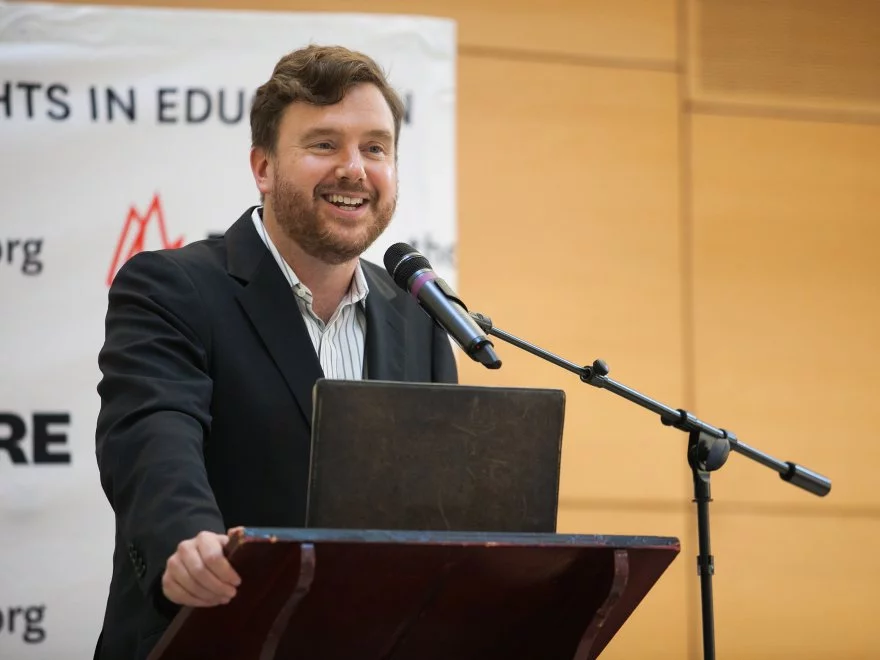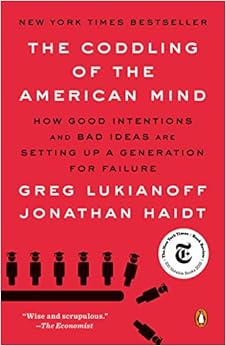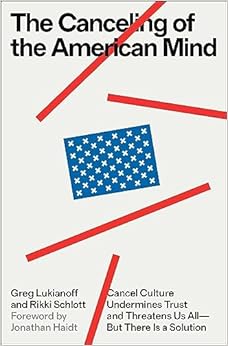Greg Lukianoff, president of FIRE, on Cancel Culture and how to stand up to it: “People of all political stripes engage in Cancel Culture because it’s frankly a lot easier to ostracize one’s opponent than to engage with the substance of his or her arguments.”

Published 9/1/2023
Greg Lukianoff is a renowned free speech champion, bestselling author, and the president of the Foundation for Individual Rights and Expression (FIRE). He is also an old friend of our Founder, Ayaan Hirsi Ali, and he will be speaking to her in the upcoming third webinar of The Ayaan Hirsi Ali Dialogues series. The webinar takes place on September 18 at 11 am EDT. You can sign up for the webinar here and find out more about the series from Ayaan here.
The webinar will address the themes of Greg’s new book (co-authored with Rikki Schlott) The Canceling of the American Mind, primarily the nature of Cancel Culture and how to stand up to it. Below, we asked Greg a few questions about his life and work. His answers make for essential reading both in themselves and in anticipation of the webinar.
AHA Foundation: Thanks for talking with us today, Greg. Could you tell us a little more about your background and previous books?
Greg Lukianoff: I’ve been at FIRE since 2001 when I was hired as our first legal director. In fact, I happened to land in Philly to start the job on 9/11. As you might guess, some of my first and most memorable cases revolved around professors getting in trouble for controversial statements about the tragedy.
 In 2012 I published my first book, Unlearning Liberty: Campus Censorship and the End of American Debate, in which I warned that higher education was teaching younger people to think like censors. The big difference between now and then is that when the book came out students were the best constituency for freedom of speech on campus, better than professors, and far and away better than administrators. Indeed, I had a sense in 2012 that maybe things were starting to get a little bit better. Little did I know that, at the end of the following year, things were about to start getting much, much worse. In 2014 I came out with my very short booklet, Freedom From Speech, which is probably my favorite title that I’ve written, about the rise of student-driven censorship, unlike anything seen on campus since the 1980s and the heyday of political correctness and speech codes.
In 2012 I published my first book, Unlearning Liberty: Campus Censorship and the End of American Debate, in which I warned that higher education was teaching younger people to think like censors. The big difference between now and then is that when the book came out students were the best constituency for freedom of speech on campus, better than professors, and far and away better than administrators. Indeed, I had a sense in 2012 that maybe things were starting to get a little bit better. Little did I know that, at the end of the following year, things were about to start getting much, much worse. In 2014 I came out with my very short booklet, Freedom From Speech, which is probably my favorite title that I’ve written, about the rise of student-driven censorship, unlike anything seen on campus since the 1980s and the heyday of political correctness and speech codes.
Also in 2014 I approached author and social psychologist Jonathan Haidt about the new, disturbing trends I was seeing and a weird idea I had about combining freedom of speech and academic freedom with cognitive behavioral therapy. Students across American colleges started demanding to be protected from ideas that they claimed to be “harmful” in increasingly medicalized and hyperbolic terms. This is when people first started to hear about “trigger warnings” and “safe spaces.”
In 2015, Haidt and I published a cover story for The Atlantic which explored this phenomenon under the title ‘The Coddling of the American Mind.’ We clearly saw the threat to both freedom of speech and mental health on the horizon, and although the article was widely read and popular, unfortunately it seems to have done nothing to stem the tide. In 2018, when things had only gotten worse, we published a book under the same name fleshing out the ideas in the op-ed.
Side note: I’ve always hated the title ‘The Coddling of the American Mind.’ I thought using the word “coddling” in this context was needlessly provocative and likely to distract from the substantive points we were trying to make. I wanted to call the essay ‘Arguing Towards Misery’ and the subsequent book Disempowered to highlight how the students themselves were the victims in all this, and how the ideology they had absorbed was deeply depressing, debilitating, and counter-productive to leading healthy, well-adjusted lives. Obviously, the editors won out and, in their defense, the chosen title likely sold more books than my preferred title would have.
AHA Foundation: Can you tell us more about FIRE, its development, and your role there?
Greg Lukianoff: FIRE was founded in 1999 by Alan Charles Kors and Harvey Silverglate. Kors, a right-leaning libertarian, is a scholar of the European Enlightenment and an expert on Voltaire. Silverglate, a left-leaning libertarian, is a criminal defense & civil liberties attorney and journalist. The two met while studying at Princeton and were brought together by their shared antipathy toward Princeton’s policy of requiring students to attend Mass. They published The Shadow University in 1998, highlighting some of the most egregious contemporary miscarriages of academic freedom.
They founded FIRE in 1999 and Harvey likes to joke that they thought they’d close up shop within a few years having successfully solved the free speech crisis in American higher education. Needless to say—while moral panics around issues like political correctness, race, and gender wax and wane over the years—anyone who’s been paying attention will attest that the threats to academic freedom and free speech in academia have only grown and metastasized 24-odd years later.
As I mentioned, in 2001 I started as FIRE’s first legal director. In 2005 I was asked to take on the role of president. Over the years, many of our supporters asked us if we might consider expanding our purview to defend free speech beyond higher education. We resisted these appeals for a long time, because my primary goal was to achieve near-comprehensive coverage of the problems in academia.
“While we’ve expanded our efforts to defend the free speech rights of ALL Americans, students and faculty can still count on FIRE to come to their aid when censorship and illiberalism rear their ugly heads on campus.”
In the last few years, with the creation and evolution of FIRE’s College Free Speech Rankings, I began to feel that we had finally achieved this coverage. So, in June of last year, we announced our transformation from the Foundation for Individual Rights in Education into the Foundation for Individual Rights and Expression. We decided we just couldn’t abandon the trusted brand that the “FIRE” moniker had earned over the first 23 years of its existence. And, in keeping with the consistency of our acronym, we’ve also doubled down on our commitment to higher education. While we’ve expanded our efforts to defend the free speech rights of ALL Americans, students and faculty can still count on FIRE to come to their aid when censorship and illiberalism rear their ugly heads on campus.
AHA Foundation: In your new book, you discuss Cancel Culture and the threat it poses to free speech. So: what exactly is Cancel Culture?
Greg Lukianoff: A lot of very smart people have spilled a lot of ink trying to define the phenomenon, and chapter 1 of our book analyzes some of our favorite definitions. The one we eventually landed on is the following: Cancel Culture is the uptick beginning around 2014, and accelerating in 2017 and after, of campaigns to get people fired, disinvited, deplatformed, or otherwise punished for speech that is—or would be—protected by First Amendment standards and the climate of fear and conformity that has resulted from this uptick.
AHA Foundation: What do people misunderstand about Cancel Culture? For example, some would say that Cancel Culture is merely holding the powerful to account, or that Cancel Culture is a right wing myth.
Greg Lukianoff: We actually have an FAQ section in the appendix that addresses some of these common critiques. “Cancel Culture is just accountability” is the very definition of begging the question. It assumes by its very wording that everyone targeted by Cancel Culture deserves to be held accountable for something, and therefore provides little more information than, “I just assume everyone targeted deserves it!” It’s an unserious, flippant answer that somehow is treated as if it’s a serious response.
And the idea that “it’s just a right wing myth” completely ignores the reality that Cancel Culture has claimed its fair share of liberal scalps as well as conservative ones. In anticipation of that common retort, we decided to start every chapter with a quote from notable figures ranging the political spectrum, each raising alarm about the rising tide of Cancel Culture—people including the Pope, Barack Obama, Taylor Swift, James Carville, Helena Bonham Carter, Cornel West, Bill Maher, and Tom Hanks.
AHA Foundation: Could you provide a couple of examples of Cancel Culture that show, irrefutably, how real and dangerous it is?
Greg Lukianoff: The case which I come back to often is that of Mike Adams at the University of North Carolina. Mike had a long history with FIRE because he was constantly getting in trouble for his speech in the classroom, and over the years we became friends. Following a long-fought legal battle with his employer after which he continued to receive death threats and harassment, Mike took his own life in July 2020. I speak about Mike often to keep his memory alive and in hopes that audiences will grapple with the real life-and-death consequences of Cancel Culture. You can read more about his story here.
“Perhaps least appreciated but most importantly, Cancel Culture destroys trust in expertise … If someone can lose their job for having the wrong opinion, why should the public trust anyone to be truthful?”
Another example of the dangers of Cancel Culture is the case of adjunct professor Erika López Prater at Hamline University. After issuing multiple warnings and giving students the opportunity to turn away, Prater, an art history instructor, displayed a famous painting depicting the prophet Muhammad. Despite the facts that Prater warned the class, that versions of the painting are displayed and sold in markets all over the Muslim world, and that the sacrilege of depicting Muhammad is contested amongst Muslims, the university caved to the demands of students and at least one outside organization and declined to renew Prater’s contract. More details on this case can be found here.
Perhaps least appreciated but most importantly, Cancel Culture destroys trust in expertise. After all, if, for example, Carole Hooven can be, for a time, forced out of her job at Harvard because she simply recognizes the reality of biological sex, why should anyone trust anybody in academia on issues around trans, gender, and sex? If someone can lose their job for having the wrong opinion, why should the public trust anyone to be truthful?
AHA Foundation: Is Cancel Culture a generational issue? Are the young more likely to cancel people they disagree with?
Greg Lukianoff: I’m careful not to paint with a broad brush, or lay blame at the feet of any particular generation—partly because if a generation of students has absorbed terrible mental habits which we believe they have, it’s likely their parents’ generation who is responsible—but as Haidt and I explain in our 2015 article in The Atlantic and expand upon in The Coddling of the American Mind, starting somewhere around 2014, the cohort of students arriving on college campuses was dramatically different from its predecessors in a number of ways.
One way was that students seemed to have embodied some terrible mental habits that directly contradict both ancient wisdom as well as modern psychological research and scholarship. We dubbed these bad ideas the “The Three Great Untruths”:
- What doesn’t kill you makes you weaker.
- Always trust your feelings.
- Life is a battle between good people and evil people.
 The second way they were different from previous classes was in their insistence that speech could be violent or harmful, thus leading to their demands for administrators to protect them against speech that they disliked or disagreed with. This is when we started to hear about “safe spaces” and “microaggressions.” It takes no great leap to get from the idea that “speech can inflict real harm” to the conclusion that “people who espouse harmful speech should be censored and ostracized from polite society.”
The second way they were different from previous classes was in their insistence that speech could be violent or harmful, thus leading to their demands for administrators to protect them against speech that they disliked or disagreed with. This is when we started to hear about “safe spaces” and “microaggressions.” It takes no great leap to get from the idea that “speech can inflict real harm” to the conclusion that “people who espouse harmful speech should be censored and ostracized from polite society.”
AHA Foundation: Your co-author Rikki Schlott is Gen Z—did her perspective change the way you saw Cancel Culture and all the problems that stem from it?
Greg Lukianoff: I was really excited to co-author this book with Rikki. Not only is she brilliant, but she really understands the value in the economy of words. When she reached out to me and Haidt to share her experience at New York University, I could tell that she had an exceptional mind, not just for someone her age, but for anyone in any generation. Her age and experience as a Gen-Z journalist, though, has absolutely been a boon and proven invaluable in writing what is meant to be the definitive story of Cancel Culture.
AHA Foundation: Why and how do both left and right engage in Cancel Culture?
Greg Lukianoff: The “why” here is quite simple: people of all political stripes engage in Cancel Culture because it’s frankly a lot easier to ostracize one’s opponent than to engage with the substance of his or her arguments.
The “how” is more complicated. The left uses what I’ve dubbed the “perfect rhetorical fortress.” This strategy involves layers and layers of cheap tricks, demographic dismissals, and logical fallacies that allow the user to avoid ever engaging with the substantive arguments of someone they disagree with. Most of these involve disqualifying one’s opponent because he or she doesn’t belong to whichever identity group that, in the view of the identitarian left, has a monopoly on speaking about a particular issue. Each successive layer allows its users to eventually disqualify almost the entire population from participating in a conversation when it suits them.
The right, on the other hand, uses what I call the “efficient rhetorical fortress.” This way of arguing allows its users to disqualify experts, journalists, liberals, and, in MAGA circles, anyone deemed insufficiently loyal to Trump.
AHA Foundation: What is the solution to Cancel Culture? How can we promote what you call in the book a “Free Speech Culture” instead?
 Greg Lukianoff: We have a chapter in the book called “The Adulthood of the American Mind” where we explain that Free Speech Culture has historically been expressed through popular idioms that most people will be familiar with: “It’s a free country,” “to each his own,” “sticks and stones,” “everyone is entitled to their own opinion,” “address the argument not the person,” “different strokes for different folks,” and “who am I to judge?”
Greg Lukianoff: We have a chapter in the book called “The Adulthood of the American Mind” where we explain that Free Speech Culture has historically been expressed through popular idioms that most people will be familiar with: “It’s a free country,” “to each his own,” “sticks and stones,” “everyone is entitled to their own opinion,” “address the argument not the person,” “different strokes for different folks,” and “who am I to judge?”
These expressions highlight the importance of viewpoint diversity, tell children they have the capacity to be resilient in the face of discomfort, and remind people to be epistemically humble and to constantly question whether they might in fact be wrong. These idioms, unfortunately, have fallen out of favor in popular culture. We believe that reminding society of the eternal wisdom of these once-popular sayings would go a long way to rehabilitating America’s Free Speech Culture.
AHA Foundation: Finally, we understand that you were familiar with our Founder Ayaan Hirsi Ali before agreeing to do this upcoming webinar with her. Did her experiences with censorship (from both Islamists and college students) affect how you think about free speech?
Greg Lukianoff: I actually met Ayaan multiple times before I fully understood who exactly she was. As far as I could tell, she was an extremely friendly, brilliant person who I’d occasionally see at events in DC. Discovering that she was feared and hated, and that there were even people who wanted to kill her, blew me away.
I read her first two books and was really struck by the fact that, according to the logic of oppression so dominant in American higher education, she should have been seen as a primary voice of social justice: a Black Somali woman and victim of female genital mutilation standing up against a patriarchal, highly conservative religion which, in its most fundamentalist form, badly oppresses women to the point at which they’re not allowed to receive an education.
She should have been a hero to the left. But due to some strange double standard on the left about religions in our own country and religions abroad, particularly Islam, some are able to see the problems posed by fundamentalist Christianity and yet don’t take seriously the problems posed by fundamentalist Islam even though those problems can be so severe and so deadly. Ayaan is the definition of courage.
Find out more about Greg, including how to get his previous books
Find out more about The Canceling of the American Mind
FIRE’s College Free Speech Rankings
Sign up for the September 18 webinar now


